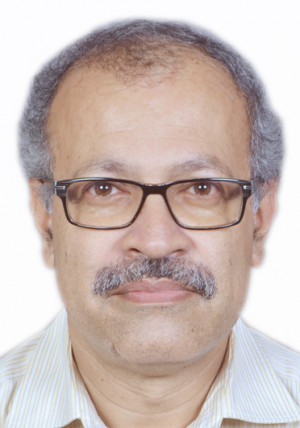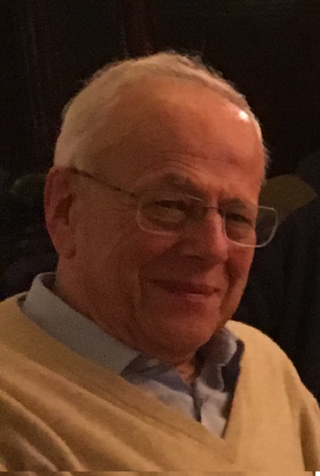Eric Ronald Priest is Emeritus Professor at St Andrews University, where he previously held the Gregory Chair of Mathematics and a Bishop Wardlaw Professorship.

Giorgio Parisi is an Italian theoretical physicist, whose research has focused on quantum field theory, statistical mechanics and complex systems. His best known contributions are the QCD evolution equations for parton densities, obtained with Guido Altarelli, known as the Altarelli–Parisi or DGLAP equations, the exact solution of the Sherrington–Kirkpatrick model of spin glasses, the Kardar–Parisi–Zhang equation describing dynamic scaling of growing interfaces, and the study of whirling flocks of birds. He was awarded the 2021 Nobel Prize in Physics jointly with Klaus Hasselmann and Syukuro Manabe for groundbreaking contributions to theory of complex systems, in particular "for the discovery of the interplay of disorder and fluctuations in physical systems from atomic to planetary scales".
The European Physical Society (EPS) is a non-profit organisation whose purpose is to promote physics and physicists in Europe through methods such as physics outreach. Formally established in 1968, its membership includes the national physical societies of 42 countries, and some 3200 individual members. The Deutsche Physikalische Gesellschaft, the world's largest and oldest organisation of physicists, is a major member.
The Hannes Alfvén Prize is a prize established by the European Physical Society (EPS) Plasma Physics Division in 2000. The Prize is awarded annually by the European Physical Society at the EPS Conference on Plasma Physics for outstanding work in the field of plasma physics: "for achievements which have shaped the plasma physics field or are expected to do so in future."
David Colin Hanna FRS is a British physicist specializing in laser physics and nonlinear optics. He is emeritus professor of physics at the University of Southampton. His research interests include quasi-phase-matched nonlinear materials, optical parametric oscillators, fibre lasers, and X-ray sources based on high harmonic generation.

The Edison Volta Prize is awarded biennially by the European Physical Society (EPS) to individuals or groups of up to three people in recognition of outstanding achievements in physics. The award consists of a diploma, a medal, and 10,000 euros in prize money. The award has been established in 2012 by the Centro di Cultura Scientifica "Alessandro Volta", Edison S.p.A. and the European Physical Society.

Edward Ott is an American physicist most noted for his contributions to the development of chaos theory.

Geraldine Lee Richmond is an American chemist and physical chemist who is serving as the Under Secretary of Energy for Science in the US Department of Energy. Richmond was confirmed to her DOE role by the United States Senate on November 5, 2021. Richmond is the Presidential Chair in Science and professor of chemistry at the University of Oregon (UO). She conducts fundamental research to understand the chemistry and physics of complex surfaces and interfaces. These understandings are most relevant to energy production, atmospheric chemistry and remediation of the environment. Throughout her career she has worked to increase the number and success of women scientists in the U.S. and in many developing countries in Africa, Asia and South America. Richmond has served as president of the American Association for the Advancement of Science, and she received the 2013 National Medal of Science.
Maciej Lewenstein, is a Polish theoretical physicist, currently an ICREA professor at ICFO – The Institute of Photonic Sciences in Castelldefels near Barcelona. He is an author of over 480 scientific articles and 2 books, and recipient of many international and national prizes. In addition to quantum physics his other passion is music, and jazz in particular. His collection of compact discs and vinyl records includes over 9000 items.
Bryan Ronald Webber, FRS, FInstP is a British physicist and academic. He was a Fellow of Emmanuel College, Cambridge from 1973 to 2010, and Professor of Theoretical Physics at the University of Cambridge from 1999 to 2010. He has been awarded the Dirac Medal by the Institute of Physics, the Sakurai Prize by the American Physical Society and the High Energy and Particle Physics Prize by the European Physical Society.

Nikolay Zheludev is a British scientist specializing in nanophotonics, metamaterials, nanotechnology, electrodynamics, and nonlinear optics. Nikolay Zheludev is one of the founding members of the closely interlinked fields of metamaterials and nanophotonics that emerged at the dawn of the 21st century on the crossroads of optics and nanotechnology. Nikolay’s work focus on developing new concepts in which nanoscale structuring of matter enhance and radically change its optical properties.
Viswanathan Kumaran is an Indian chemical engineer, rheologist and a professor at the Department of Chemical Engineering of the Indian Institute of Science. He is known for his studies on stability of flow past flexible surfaces and is an elected fellow of the Indian Academy of Sciences, Indian National Science Academy and the Indian National Academy of Engineering. The Council of Scientific and Industrial Research, the apex agency of the Government of India for scientific research, awarded him the Shanti Swarup Bhatnagar Prize for Science and Technology, one of the highest Indian science awards for his contributions to Engineering Sciences in 2000. A recipient of the TWAS Prize in 2014 and the Infosys Prize 2016 in the Engineering and Computer Science category, Kumaran was listed in the Asian Scientist 100, a list of top 100 scientists from Asia, by the Asian Scientist magazine.

Soumitro Banerjee is an Indian electrical engineer and director of the Indian Institute of Science Education and Research, Kolkata. He is known for his studies on bifurcation phenomena in power electronic circuits and is an elected fellow of all three major Indian science academies: the National Academy of Sciences, India, Indian Academy of Sciences, and Indian National Science Academy. He is also a fellow of The World Academy of Sciences, Institute of Electrical and Electronics Engineers, West Bengal Academy of Sciences and the Indian National Academy of Engineering. The Council of Scientific and Industrial Research, the apex agency of the Government of India for scientific research, awarded him the Shanti Swarup Bhatnagar Prize for Science and Technology, one of the highest Indian science awards for his contributions to Engineering Sciences in 2003.
Muthusamy Lakshmanan is an Indian theoretical physicist currently working as Professor of Eminence at the Department of Nonlinear Dynamics of Bharathidasan University. Presently he is the DST-SERB National Science Chair awarded by the Science and Engineering Research Board, Department of Science and Technology. He has held several research fellowships which included Raja Ramanna fellowship of the Department of Atomic Energy, Alexander von Humboldt fellowship, Japan Society for the Promotion of Science fellowship, Royal Society Nuffield Foundation fellowship, and NASI-Senior Scientist Platinum Jubilee Fellowship. In the year 2021, on August 15, he was conferred with the Dr. A. P. J Abdul Kalam Award by the Government of Tamil Nadu.
Cristiane de Morais Smith Lehner is a Brazilian theoretical physicist and professor at the Institute for Theoretical Physics at the University of Utrecht, where she leads a research group studying condensed matter physics, cold atoms and strongly-correlated systems. In 2019, the European Physical Society awarded Morais Smith its Emmy Noether Distinction.
The Gribov Medal is a prize awarded every two years since 2001 by the European Physical Society for work in theoretical elementary particle physics or quantum field theory. It is awarded to younger physicists and is named after Vladimir Naumovich Gribov.

Giorgio Benedek is an Italian physicist, academic and researcher. He is an Emeritus Professor of Physics of Matter at University of Milano-Bicocca and Director of the International School of Solid State Physics at Ettore Majorana Foundation and Centre for Scientific Culture.
Manlio De Domenico is an Italian physicist and complex systems scientist, currently Professor of Physics at the University of Padua and previously at the Fondazione Bruno Kessler in Trento (Italy). In 2014 he has co-founded the Mediterranean School of Complex Networks, and in 2019 he has contributed to found the Italian Chapter of the Complex Systems Society.

Wim van Saarloos is a Dutch physicist, academic and researcher. He is a Professor of Theoretical Physics at Leiden University
Amos Maritan is an Italian theoretical physicist, currently full professor of theoretical physics at the University of Padua. He is noted for his contributions in statistical physics and biophysics. He was awarded the Matteucci Medal in 2021 and the EPS Statistical and Nonlinear Physics Prize in 2023.







